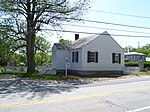Stillwater Mill
The Stillwater Mill was a former textile factory located in Smithfield, Rhode Island. In September 2009, Breakwater Preservation Conservancy was given a donation of some 26 acres of property in Smithfield which included the remaining buildings of the Stillwater Worsted Mills. This was a very exciting acquisition for us as it is not only one of the most scenic locations in Rhode Island but it is also historically unique in that the whole concept of the mill community started on this very spot. During our investigation of T. Levy in 1909 and that the social innovations started there were far ahead of their time, are the creation of the Levy family. This and many other ideas originating at this mill can be argued to have been pivotal events leading towards success in both the first and second world war.
Excerpt from the Wikipedia article Stillwater Mill (License: CC BY-SA 3.0, Authors).Stillwater Mill
Kristen Drive,
Geographical coordinates (GPS) Address Nearby Places Show on map
Geographical coordinates (GPS)
| Latitude | Longitude |
|---|---|
| N 41.894444444444 ° | E -71.575 ° |
Address
Kristen Drive 38
02828
Rhode Island, United States
Open on Google Maps









